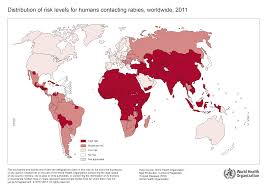rabies

n. [内科] 狂犬病,恐水病
n.
[医]狂犬病;恐水病;
英英释义
rabies[ 'reibi:z ]
n.an acute viral disease of the nervous system of warm-blooded animals (usually transmitted by the bite of a rabid animal); rabies is fatal if the virus reaches the brain
同义词:hydrophobialyssamadness
词组短语
rabies vaccine狂犬病疫苗
rabies virus狂犬病病毒
双语例句
用作名词(n.)
He had a vaccination against rabies.
他做了疫苗注射以预防狂犬病。
Animals with rabies often froth at the mouth.
患狂犬病的动物常常口吐白沫。
权威例句
WHO Expert Consultation on rabiesWHO Expert Consultation on Rabies. Second report.
Re-evaluating the burden of rabies in Africa and Asia
Survival after Treatment of Rabies with Induction of Coma
Expression of the rabies virus glycoprotein in transgenic tomatoes.
Survival after treatment of rabies with induction of coma.
Population density, survival, and rabies in raccoons in an urban national park
Vaccination with a plasmid vector carrying the rabies virus glycoprotein gene induces protective immunity against rabies virus
Can vaccination validated by the titration of rabies antibodies in the serum of cats and dogs be an alternative to quarantine measur...
Goodwin, George G. and Arthur M. Greenhall. A Review of the Bats of Trinidad and Tobago: descriptions, rabies infection, and ecology...
rabies
rabies: [17] Latin rabiēs meant ‘fury, madness’ (it is the source of English rage). Hence it came to be used for ‘madness in dogs’, and was subsequently adopted as the name of the disease causing this, when it came to be identified. The word was derived from the verb rabere ‘be mad’, as also was rabidus, source of English rabid [17].=> rabid, rage
rabies (n.)
1590s, from Latin rabies "madness, rage, fury," related to rabere "be mad, rave" (see rage (v.)). Sense of "extremely fatal infectious disease causing madness in dogs" was a secondary meaning in Latin. Known hydrophobia in humans.
1. Rabies has been considered an invariably fatal, terrifying disease for centuries.
许多世纪以来,狂犬病总是被认为是致命的,可怕的疾
-- 来源 -- 英汉 - 辞典例句
2. have your dog vaccinated against rabies
给你的狗注射疫苗以预防狂犬病.
-- 来源 -- 汉英 - 翻译参考
3. Animals with rabies often froth at the mouth.
患狂犬病的动物常常口吐白沫.
-- 来源 -- 英汉 - 辞典例句
4. In ancient Greek literature botn Democritus (460 B. C. ) and Aristotle (384-322 B. C) referred to rabies.
在古希腊文献中,德漠克利特(公元前460-362)和亚里斯多德(公元前384-322)曾提到了狂犬
-- 来源 -- 英汉 - 辞典例句
5. In dumb rabies there is a very short excitation phase.
在狂犬病潜伏期,有一非常短的兴奋期。
-- 来源 -- 英汉 - 辞典例句
6. In cattle, rabies is transmitted exclusively from the bite of salivs infected rabid animals.
在牛,狂犬病仅能由患狂犬病动物通过唾液的咬伤而传播。
-- 来源 -- 英汉 - 辞典例句
7. Rabies is characterized by a syndrome of excitation, depression, paralysis, coma and death.
狂犬病以兴奋、抑制、麻痹、昏迷和死亡为特征。
-- 来源 -- 英汉 - 辞典例句
8. There was a rabies scare in town.
城里发生了狂犬病恐慌。
-- 来源 -- 英汉 - 辞典例句
9. Animal rabies can be classified as furious or dumb.
动物狂犬病可分为狂暴的和沉默的二类。
-- 来源 -- 英汉 - 辞典例句
10. Listen to this: a boy in London has died of rabies.
你听听这件事: 伦敦有一个男孩儿得狂犬病死了.
-- 来源 -- 英汉 - 辞典例句
